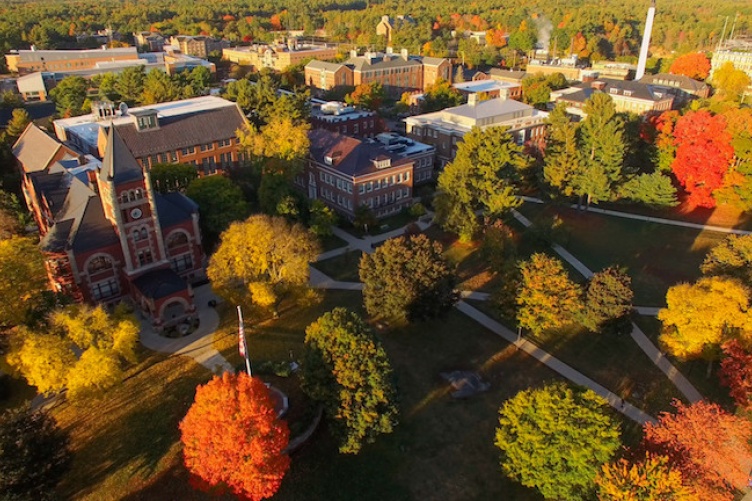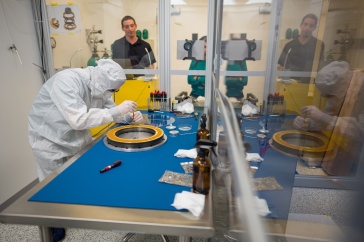
Fifteen teams representing 35 UNH faculty and staff members from across the university, as well as 26 external partners, were awarded Collaborative Research Excellence (CoRE) funding. The CoRE initiative of UNH’s Office of Research, Economic Engagement and Outreach supports interdisciplinary and collaborative efforts driven by UNH researchers addressing local, regional and world issues.
“UNH values its interdisciplinary research and scholarship efforts to address societal challenges.”
“UNH values its interdisciplinary research and scholarship efforts to address societal challenges. We are pleased to have so many research teams participate in CoRE and are particularly excited about the involvement of numerous external partners representing industry, federal and state agencies, non-profit organizations and other academic institutions,” says Marian McCord, senior vice provost for research, economic engagement, and outreach.
CoRE funded projects in four categories:
Creating New Centers provides funding over two years to establish new, interdisciplinary centers with research programs that have strong potential for significant future external funding support.
- Center for Acoustics Research and Education (CARE), second year of funding. Leads: Jennifer Miksis-Olds, research professor and CARE director; Anthony Lyons, research professor in the Center for Coastal and Ocean Mapping; and Daniel Howard, assistant professor of biological sciences.
Supporting Large, Complex Proposal Development provides funding (up to $100,000 for one year) to shape and position major, interdisciplinary external grants with an annual budget greater than or equal to $3.5 million for success.
- Mid-scale Infrastructure – Methane. Lead: Ruth Varner, professor of Earth sciences.
Pilot Research Projects seed-funds collaborative research projects for one year with strong potential to attract future funding from external sources and/or with outstanding commercial potential.
- Geo-Inspired Additive Manufacturing for Green Stormwater Infrastructure: Majid Ghayoomi, associate professor of civil and environmental engineering.
- Diversified syrups: Heidi Asbjornsen, associate professor of natural resources and the environment.
- Brains on Bugs Not Drugs: Cheryl Whistler, professor of molecular, cellular and biomedical sciences.
- Healthy Families Flourish: Sarah Smith, assistant professor of occupational therapy; Betsy Humphreys, research assistant professor at the Institute on Disability; and Marguerite Corvini, project director at the Institute for Health Policy and Practice.
- Permafrost Microbiomes: Jessica Ernakovich, assistant professor of natural resources and the environment.
- Memory Cells: Xuanmao Chen, assistant professor of molecular, cellular and biomedical sciences.
- Green Battery for Green Home (Green4Green): Xiaowei Teng, professor of chemical engineering.
Interdisciplinary Working Groups support groups of faculty for one year to convene around research topic areas to build awareness and relationships across disciplines, allow for cross-fertilization of ideas, identify potential collaborative research opportunities and provide a venue for finding partners.
- Future Crops: Iago Hale, associate professor of agriculture, nutrition and food system.
- CiRCUiTs: Convergent Climate Response in Coastal Urbanization: Jennifer Brewer, associate professor of geography; Katharine Duderstadt, research scientist in the Earth Systems Research Center; and Jennifer Jacobs, professor of civil and environmental engineering.
- New Frontiers of Work: Vidya Sundar, associate professor of occupational therapy.
- Food & Climate Research Network: Jennifer Wilhelm, NH Food Alliance and the Sustainability Institute.
- SEEDAC: Student Experience and Engagement Data Assets Collaborative: Mihaela Sabin, professor of applied engineering and sciences at UNH Manchester.
- The NH Youth Retention Initiative: Andrew Coppens, assistant professor of education; and Erin Sharp, associate professor of human development and family studies.
CoRE received 32 applications seeking more than $1 million in funding for this year’s competition. The CoRE initiative launched in FY18, and over its first three years, 46 interdisciplinary project teams received awards. Those projects have reported a breadth of research and scholarship outputs that include more than $46 million in external grant proposal submissions; $27 million in new awards; numerous manuscript submissions to peer-reviewed journals; and conferences, workshops, and presentations that have engaged more than 3,000 academic, community and industry partners.
CoRE will host a Zoom seminar Monday, Nov. 9, 2020, from 2 - 3 p.m. to highlight these new projects. Zoom details, an agenda overview, and information about each project are here. For more information on CoRE, contact Mark Milutinovich, senior director, Research & Large Center Development, and Maria Emanuel, manager, Collaborative Research Excellence Initiative, or visit the CoRE website.
-
Written By:
Maria Emanuel | CoRE | maria.emanuel@unh.edu



















































